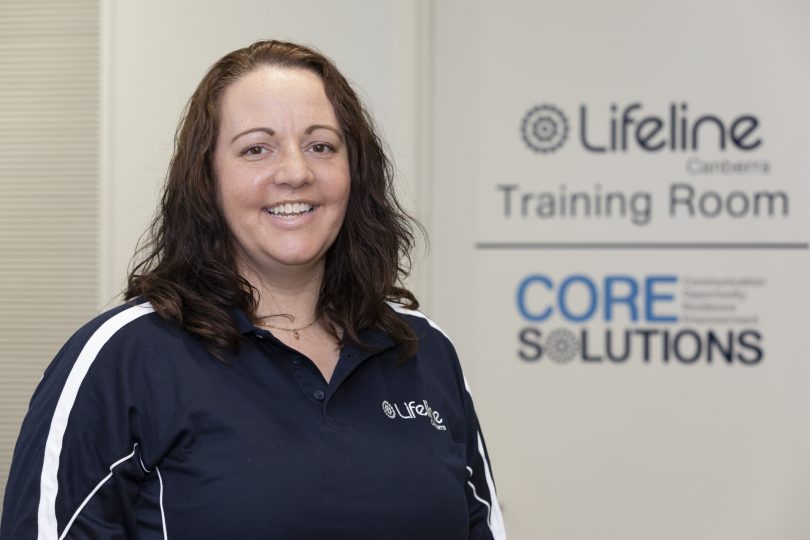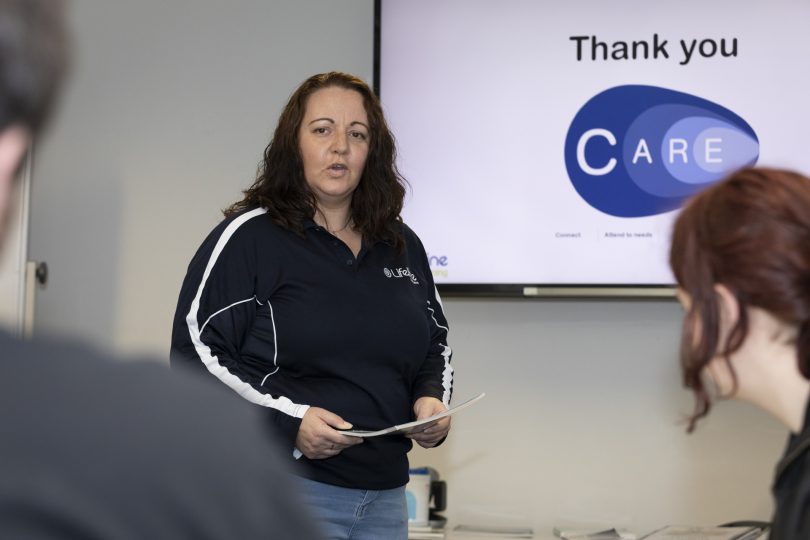
Lifeline Canberra trainer Alisha Tarrant has been answering the phones for Lifeline for over a decade.
Every 30 seconds a Lifeline telephone crisis supporter starts another potentially life-saving conversation.
Every call is different, every scenario unique, but there is an overarching commonality between the calls, especially during COVID-19.
“People want someone who is able to listen to you at your ugliest moments, when you are at your most vulnerable,” Lifeline Canberra’s Programs Manager and trainer Alisha Tarrant said.
Lifeline’s new intake for crisis support workers is now open, and Canberrans are being encouraged to apply to help manage the influx of calls the service has received as community anxiety and stress continues to rise because of COVID-19.
The Canberra call centre currently operates 18-hours a day and has 300 volunteers on the phones. Up to 11 call support workers are answering calls at any given time.
“It is really good to be a part of a community who are all working towards the same goal,” Alisha said. “You actually end up learning more about yourself being a crisis supporter than you learn about others, especially when you do feel like you are at a push point.
“It helps you not only learn how to support others but it complements your growth as an individual. You recognise the humanity in yourself when you are speaking to some of these people and thinking, ‘I cannot relate to their story, but I can relate to how they are feeling – uncertain, in pain and scared'”.
The current intake aims to have new volunteers trained up before the call line reaches its peak period throughout the festive season at the end of the year when people start to feel more isolated, lonely and overwhelmed.
The training course is broken up into three stages. The initial block comprises 10 face-to-face sessions over a three-month period. The trainee then moves to a student placement position. This is when new volunteers begin answering calls while a mentor provides guidance and support.
Five months in and the nine-month internship begins. New volunteers are then able to transfer to other call centres if their situation changes.
Over a decade ago, Alisha decided to become a volunteer. She’s still answering phones today, providing the critical assistance a complete stranger is relying on her for.
“You still get a flutter and feel your heartbeat increase when you receive another call – that feeling never goes away,” Alisha said.
“Like most people here my story is a personal one. My brother died when he was 17 from suicide and that drove the passion in me to become a part of an amazing organisation that genuinely provides a listening ear.”

Lifeline Canberra trainer Alisha Tarrant with a cohort of volunteers.
If you are thinking about volunteering, you should be prepared for a long-term commitment, Alisha says. Training can take up to two years, and volunteers should be able to do at least do one four-hour shift once a fortnight.
For more information about how to become a Telephone Crisis Supporter Volunteer, visit Lifeline Canberra.
Applications for this intake close at 5:00 pm on Friday, 24 July.
Lifeline provides short-term support for people who are feeling overwhelmed or having difficulty coping or staying safe.
For confidential one-to-one support with a trained Lifeline telephone crisis supporter, call 13 11 14.
Original Article published by Dominic Giannini on The RiotACT.





